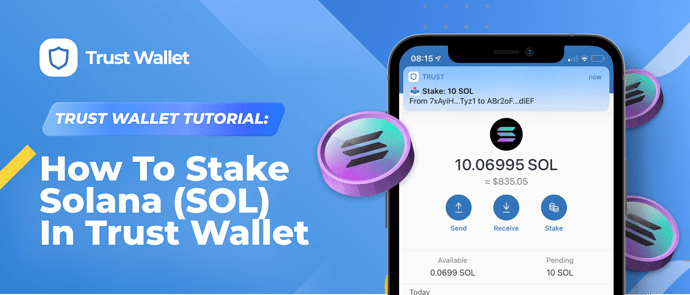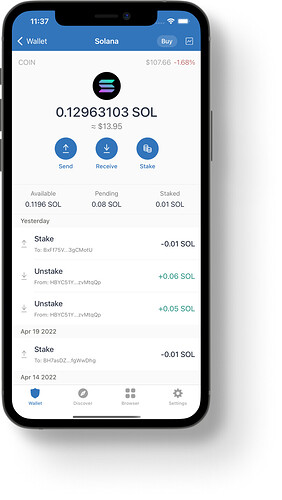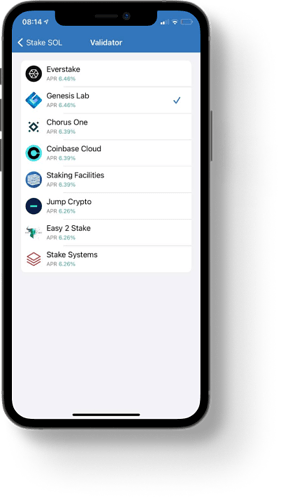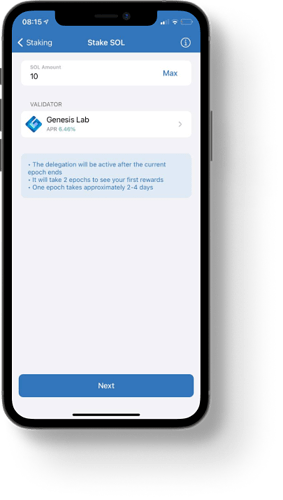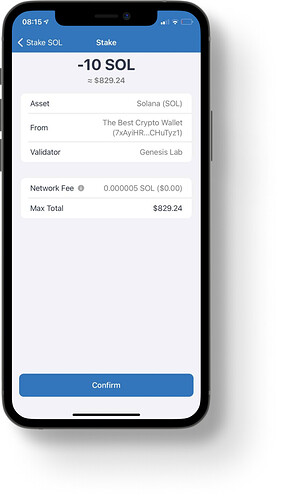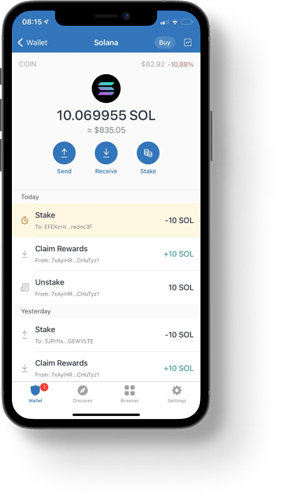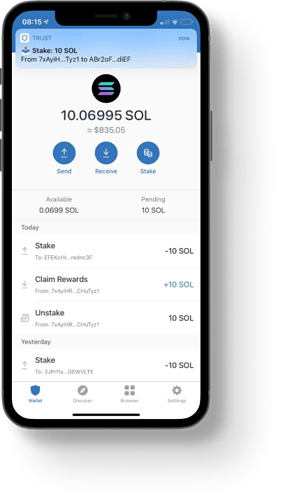Trust Wallet now enables users to stake Solana tokens natively and earn rewards inside their mobile wallet, meaning it’s easier and more secure.
Trust Wallet supports 64 different blockchains and 3M+ digital assets, giving users a one-stop-shop for holding, staking and using their favourite cryptocurrencies & NFTs.
Don’t have Trust Wallet…? ![]() [Download here!]
[Download here!]
Why Stake Solana in Trust Wallet?
-
Since Trust Wallet is multi-chain at its core, it is easier to discover the best APY% across chains and validators, stake in a few clicks and see staking rewards across tokens in one single wallet.
-
Native staking of Solana eliminates the fees you see in other wallets, because many of them rely on external protocols or smart contracts.
-
Once you have Solana in your wallet, you can start staking in 3 taps.
The Solana Token
SOL, is the governance token of Solana. Solana is a public, open-source blockchain that supports smart contracts, including non-fungible tokens (NFTs) and a variety of decentralized applications (DApps). It claims to have faster transaction speeds and lower transaction costs than it’s main competitor; Ethereum.
The SOL token has 2 use cases:
- Staking to validators
- Payment for fees used for running smart contracts and other transactions
Solana runs on a proof-of-stake (PoS), as well as a Solana innovation for time-keeping called proof-of-history (PoH). Proof-of-stake is different from proof-of-work (which relies on miners solving cryptographically challenging puzzles in order to mine blocks); instead proof-of-stake relies on stake delegations to validators to determine which validator gets to propose new blocks. Proof-of-history is a method for proving that any given transaction is in the correct sequence and found by the right ‘leader’.
About Staking Solana
Disclaimer!
Please be aware that there are risks when you stake your tokens.
Read The Risks of Staking to learn more.
SOL holders can stake their SOL to validators. In order to participate in staking, you need to have SOL on your wallet. You can stake a minimum of 0.01 SOL. Make sure you have some extra tokens that will be required for Network fees.
Trust Wallet offers the validators with the highest APY rates and can be further filtered with the validator selection tool.
Any Sol validator can submit a request to become a validator on Trust Wallet. There is a process on Trust Wallet Github here, where you can submit your pull request and a small fee will have to be paid (700 $TWT) which will then be burned.
What is the SOL Epoch and how will it affect my staking?
Staking and unstaking SOL takes place at the end of the current epoch which is approximately every 3 days. So, when staking, please bear in mind that your funds will be locked for a minimum of 6 days.
You will only start earning SOL when the next epoch takes place, meaning that if you stake your SOL at the beginning of one epoch it could take up to 3 days to start earning the APY offered by your chosen validator.
Your staking rewards will be accrue to your principal staked SOL balance at the beginning of the following epoch (meaning that your rewards will also be staked and compound in interest).
You’ll wait for a maximum of 6 days to see your first staking rewards added to your balance.
Similarly to staking, unstaking will be completed at the next epoch too. So, you’ll have to wait a maximum of 3 days until your balance is available if you have been receiving SOL staking rewards.
Reminder:
Once the SOL tokens are staked, it will be locked to the validator you have chosen until the following EPOCH. Staked SOL takes up to 3 days to unstake. You will not be able to move your tokens while they are staked.
The epoch mechanism has a unique advantage for people who stake their SOL, but then decide to unstake it quickly before the first epoch their funds are involved in takes place.
If a user decides to do this, then their SOL funds will not be locked and they can withdraw them immediately (but of course, will not receive any SOL staking rewards for that period).
Trust Wallet have developed a built in epoch calendar which is visible inside the app. This will tell you the approximate time until the next epoch, +/- a couple of hours.
Solana have their own epoch calendar available here: https://explorer.solana.com/
How to Stake Solana in your Trust Wallet
Tap on Stake button to open up the Staking menu. Tap on the Stake menu to continue.
Choose a Validator
Tap on the arrow to see the list of Active validators. Choose one to proceed.
Input the Amount of SOL
Input the amount of SOL you want to stake. Always leave some tokens for staking/unstaking fees. Tap on Next to proceed. Review the transaction and then tap on Confirm.
Reminder:
Once the SOL tokens are staked and the first epoch has taken place, it will be locked to the validator you have chosen. Staked SOL takes up to 3 days to unstake. You will not be able to move your tokens while they are staked.
Wait for Confirmation
After submitting the transaction, wait for the Solana blockchain to process and confirm it. A Stake transaction will show up on the transaction list. Go back to the Staking status screen to see the current overview of the staked tokens.
Staking Rewards
Validators and delegators that help secure the network through staking and will sometimes charge commission for their services. This is neither controlled by Trust Wallet, nor do Trust Wallet take any proportion of this commission.
The APY% will be visible from each SOL validator before you decide to stake.
Reminder:
You will need to select ‘claim rewards’ for you SOL to be returned and available in your wallet. See below.
Want to stake Solana in Trust Wallet, but don’t have Solana, or the app yet? [Download it now for free here] to purchase and stake Solana directly in Trust Wallet.
